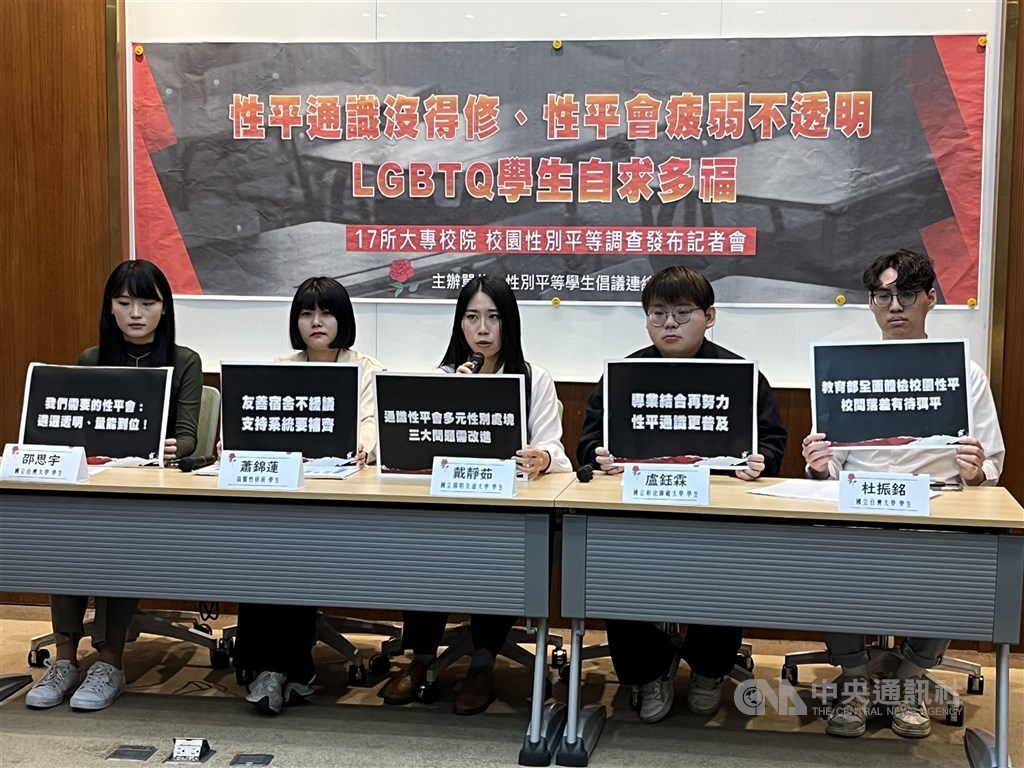Taipei, April 18 (CNA) A student advocacy group on Friday released the results of a gender equity survey conducted at 17 universities across Taiwan, revealing that all institutions fell short in areas such as support for LGBTQ students and the functioning of legally required gender equity committees.
Two days ahead of Taiwan’s Gender Equity Education Day on Sunday, the Student Alliance for Gender Equality held a news conference in Taipei, where the group’s representatives highlighted areas needing improvement in the implementation of gender equity across the country’s public and private universities.
Under the Gender Equality Education Act, every school in Taiwan must have a gender equality committee to “investigate and handle cases” related to gender equity at schools and “plan and establish a safe and gender-fair campus,” among other responsibilities.
Among those 17 universities, “two did not make their gender equity committee member lists available, and only two disclosed members’ stances on gender equity or relevant professional experience,” said Sydney Shao (邵思宇), a student at National Taiwan University (NTU).
Shao, who also serves as a student member of NTU’s gender equity committee, said that none of the 17 universities allow students to participate in the committee’s selection process, and 10 of them do not even disclose the criteria used to select committee members.
“How can students who have been hurt feel reassured under such an opaque system?” Shao questioned.
Shao added that even if a student decides to file a complaint, they are faced with a “harsh reality” of severely understaffed gender equity committees.
Six of the surveyed schools have no full-time personnel handling gender equity affairs, with responsibilities managed part-time by other staff, Shao said, noting that at universities with dedicated staff — such as NTU — one full-time officer is responsible for the needs of nearly 8,000 students.
For individuals with diverse gender identities, Lillian Hsiao (蕭錦蓮), a student at Kaohsiung Medical University’s Graduate Institute of Gender Studies, said that Article 20 of the Gender Equity Education Act stipulates that “teachers shall maintain an awareness of gender equity, eliminate gender stereotypes, and avoid gender prejudice and discrimination.”
However, many institutions have yet to fully implement such support, Hsiao said, citing data showing that only four of the 17 universities established anonymous reporting mechanisms that are consistently available to address discrimination.
Hsiao said that a nonbinary student once shared with the group that a teacher had publicly questioned them in class, asking, “Are you a boy or a girl?”
“Most of the classmates laughed after hearing the question, while the student remained silent as they did not know who they could report it to, and were afraid that speaking up might affect their grades,” Hsiao said.
“This kind of discrimination based on gender identity makes it impossible for students to feel reassured while learning in class,” Hsiao added.
Outside the classroom, dormitory arrangements in most schools are also far from inclusive, especially for transgender students, according to Josephine Tai (戴靜茹), a student at National Yang Ming Chiao Tung University.
Only six universities provide gender-friendly dormitories, and 14 have not made their transfer mechanisms for gender-diverse students publicly available, Tai said.
When seeking to change dormitories, transgender students often cannot find a designated contact point or clear procedures to follow, leaving them in a state of uncertainty and anxiety throughout the process, Tai noted.
In response to the group’s concerns, Wu Lin-hui (吳林輝), head of the Ministry of Education’s (MOE) Department of Student Affairs and Special Education, told reporters later on Friday that the ministry had previously conducted a survey and also found that some schools lacked stable staffing to handling gender equity affairs.
While such a type of staffing falls under university autonomy, Wu said the MOE had sent notices to universities as a follow-up to its own survey, urging them to prioritize the allocation of full-time personnel.
Regarding the lack of gender-friendly dormitories, Wu said that, unlike barrier-free facilities, such dormitories are not explicitly mandated under current building regulations.
The MOE is currently promoting gender-friendly dormitories through policy guidance and resource support to help universities “move forward at a quicker pace” toward achieving gender equity, he added.
